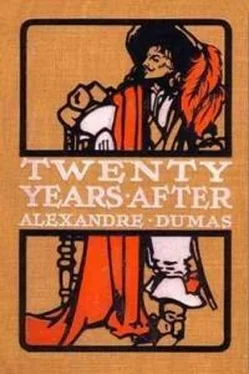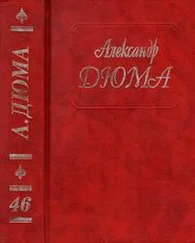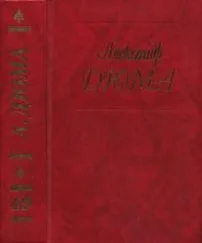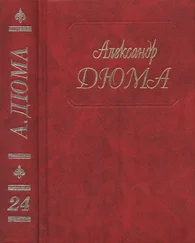The name of D’Artagnan was not altogether new to Mazarin, who, although he did not arrive in France before the year 1634 or 1635, that is to say, about eight or nine years after the events which we have related in a preceding narrative, * fancied he had heard it pronounced as that of one who was said to be a model of courage, address and loyalty.
* "The Three Musketeers."
Possessed by this idea, the cardinal resolved to know all about D’Artagnan immediately; of course he could not inquire from D’Artagnan himself who he was and what had been his career; he remarked, however, in the course of conversation that the lieutenant of musketeers spoke with a Gascon accent. Now the Italians and the Gascons are too much alike and know each other too well ever to trust what any one of them may say of himself; so in reaching the walls which surrounded the Palais Royal, the cardinal knocked at a little door, and after thanking D’Artagnan and requesting him to wait in the court of the Palais Royal, he made a sign to Guitant to follow him.
They both dismounted, consigned their horses to the lackey who had opened the door, and disappeared in the garden.
"My dear friend," said the cardinal, leaning, as they walked through the garden, on his friend’s arm, "you told me just now that you had been twenty years in the queen’s service."
"Yes, it’s true. I have," returned Guitant.
"Now, my dear Guitant, I have often remarked that in addition to your courage, which is indisputable, and your fidelity, which is invincible, you possess an admirable memory."
"You have found that out, have you, my lord? Deuce take it—all the worse for me!"
"How?"
"There is no doubt but that one of the chief accomplishments of a courtier is to know when to forget."
"But you, Guitant, are not a courtier. You are a brave soldier, one of the few remaining veterans of the days of Henry IV. Alas! how few to–day exist!"
"Plague on’t, my lord, have you brought me here to get my horoscope out of me?"
"No; I only brought you here to ask you," returned Mazarin, smiling, "if you have taken any particular notice of our lieutenant of musketeers?"
"Monsieur d’Artagnan? I have had no occasion to notice him particularly; he’s an old acquaintance. He’s a Gascon. De Treville knows him and esteems him very highly, and De Treville, as you know, is one of the queen’s greatest friends. As a soldier the man ranks well; he did his whole duty and even more, at the siege of Rochelle—as at Suze and Perpignan."
"But you know, Guitant, we poor ministers often want men with other qualities besides courage; we want men of talent. Pray, was not Monsieur d’Artagnan, in the time of the cardinal, mixed up in some intrigue from which he came out, according to report, quite cleverly?"
"My lord, as to the report you allude to"—Guitant perceived that the cardinal wished to make him speak out—"I know nothing but what the public knows. I never meddle in intrigues, and if I occasionally become a confidant of the intrigues of others I am sure your eminence will approve of my keeping them secret."
Mazarin shook his head.
"Ah!" he said; "some ministers are fortunate and find out all that they wish to know."
"My lord," replied Guitant, "such ministers do not weigh men in the same balance; they get their information on war from warriors; on intrigues, from intriguers. Consult some politician of the period of which you speak, and if you pay well for it you will certainly get to know all you want."
"Eh, pardieu!" said Mazarin, with a grimace which he always made when spoken to about money. "They will be paid, if there is no way of getting out of it."
"Does my lord seriously wish me to name any one who was mixed up in the cabals of that day?"
"By Bacchus!" rejoined Mazarin, impatiently, "it’s about an hour since I asked you for that very thing, wooden–head that you are."
"There is one man for whom I can answer, if he will speak out."
"That’s my concern; I will make him speak."
"Ah, my lord, ’tis not easy to make people say what they don’t wish to let out."
"Pooh! with patience one must succeed. Well, this man. Who is he?"
"The Comte de Rochefort."
"The Comte de Rochefort!"
"Unfortunately he has disappeared these four or five years and I don’t know where he is."
"I know, Guitant," said Mazarin.
"Well, then, how is it that your eminence complained just now of want of information?"
"You think," resumed Mazarin, "that Rochefort―"
"He was Cardinal Richelieu’s creature, my lord. I warn you, however, his services will cost you something. The cardinal was lavish to his underlings."
"Yes, yes, Guitant," said Mazarin; "Richelieu was a great man, a very great man, but he had that defect. Thanks, Guitant; I shall benefit by your advice this very evening."
Here they separated and bidding adieu to Guitant in the court of the Palais Royal, Mazarin approached an officer who was walking up and down within that inclosure.
It was D’Artagnan, who was waiting for him.
"Come hither," said Mazarin in his softest voice; "I have an order to give you."
D’Artagnan bent low and following the cardinal up the secret staircase, soon found himself in the study whence they had first set out.
The cardinal seated himself before his bureau and taking a sheet of paper wrote some lines upon it, whilst D’Artagnan stood imperturbable, without showing either impatience or curiosity. He was like a soldierly automaton, or rather, like a magnificent marionette.
The cardinal folded and sealed his letter.
"Monsieur d’Artagnan," he said, "you are to take this dispatch to the Bastile and bring back here the person it concerns. You must take a carriage and an escort, and guard the prisoner with the greatest care."
D’Artagnan took the letter, touched his hat with his hand, turned round upon his heel like a drill–sergeant, and a moment afterward was heard, in his dry and monotonous tone, commanding "Four men and an escort, a carriage and a horse." Five minutes afterward the wheels of the carriage and the horses’ shoes were heard resounding on the pavement of the courtyard.
D’Artagnan arrived at the Bastile just as it was striking half–past eight. His visit was announced to the governor, who, on hearing that he came from the cardinal, went to meet him and received him at the top of the great flight of steps outside the door. The governor of the Bastile was Monsieur du Tremblay, the brother of the famous Capuchin, Joseph, that fearful favorite of Richelieu’s, who went by the name of the Gray Cardinal.
During the period that the Duc de Bassompierre passed in the Bastile—where he remained for twelve long years—when his companions, in their dreams of liberty, said to each other: "As for me, I shall go out of the prison at such a time," and another, at such and such a time, the duke used to answer, "As for me, gentlemen, I shall leave only when Monsieur du Tremblay leaves;" meaning that at the death of the cardinal Du Tremblay would certainly lose his place at the Bastile and De Bassompierre regain his at court.
His prediction was nearly fulfilled, but in a very different way from that which De Bassompierre supposed; for after the death of Richelieu everything went on, contrary to expectation, in the same way as before; and Bassompierre had little chance of leaving his prison.
Monsieur du Tremblay received D’Artagnan with extreme politeness and invited him to sit down with him to supper, of which he was himself about to partake.
"I should be delighted to do so," was the reply; "but if I am not mistaken, the words ’In haste,’ are written on the envelope of the letter which I brought."
Читать дальше






![О Генри - Через двадцать лет [After Twenty Years]](/books/415401/o-genri-cherez-dvadcat-let-after-twenty-years-thumb.webp)





